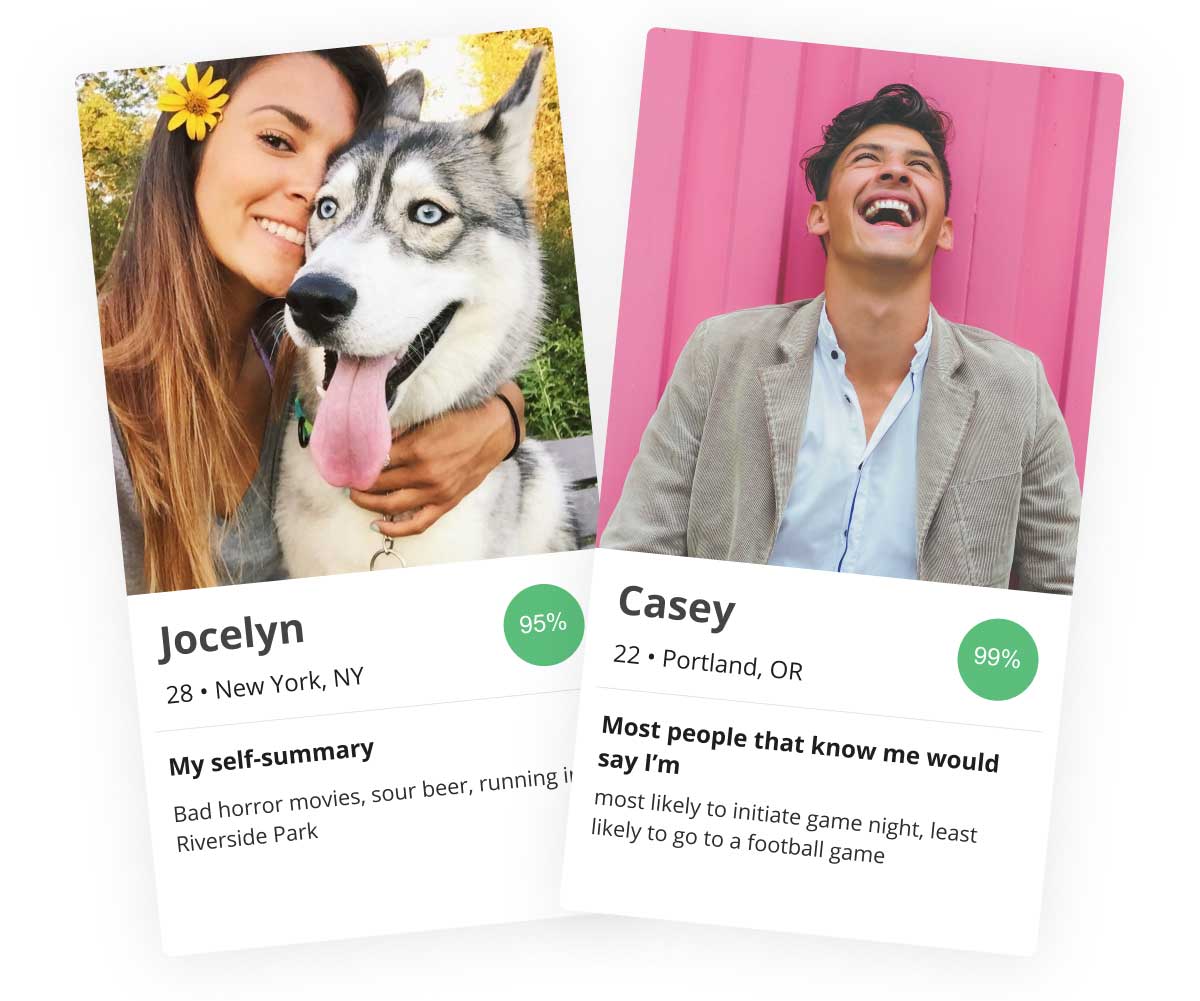Photofeeler Attractive
- Photofeeler 90 Attractive
- Photofeeler Attractive Girls
- Photofeeler Attractive Women
- Photofeeler Attractive Woman
- Photofeeler Attractive Rating
Is Photofeeler really free?
Yep. By giving your opinion (voting) on other people's photos, you earn feedback on your own.
I'm going to change up my profile soon and I wanted some advice on how to make my photos more attractive. I used photofeeler for all my photos before and I usually get an 8 minimum (usually more) on both smart and trustworthiness, but, on a good photo, I can only get between 5.5 and 6.5 on attractiveness. I want to make it higher than that. Looked average enough to me so I plugged the guy into Photofeeler and after 20 votes he got 7.9 on attractiveness (above average). And their definition of attractive man is more narrow and uniform than ever before. Distribution based on 20 votes usually goes like 2-6 votes for no/somewhat attractive. 10 attractive 4 very. Most lookismers that I tested ended in the 65-75% range. Not bad but obviously too low to compensate for autism and feminine passive behavior. 90%+ only crisick, le quack, and amnesia. It also shows that most guys cant rate other guys.
As a timesaver and to get more feedback faster, there's also the option to buy Credits instead of voting.
Who can see my photos?
When you start a test on a photo, other logged-in Photofeeler users (within your selected voter demographic) can see that photo on the voting page in order to give their feedback.
When the test is ended, the photo becomes entirely private again.
Will photos I upload here show up in Google search?
No. Your photos can only be seen by other logged-in users while you're running a test.
Will my photos ever be used or displayed without my consent?
No. Every photo Photofeeler publishes for demo or marketing purposes is with explicit permission.
Photofeeler does conduct research internally. This can mean a variety of things: having internal employees or contractors tag your photos for your gender, publicly sharing numbers or statistics of which your data may be a part, things of that nature. Never anything personal.
Do you sell my data?
Absolutely not. 100% of Photofeeler's revenue comes from Credits purchased here. In fact, Photofeeler is even ad-free.
Why test photos on Photofeeler instead of asking people I know and trust?
Wouldn't someone need to know me to accurately gauge my pictures and give good feedback?

Actually, no. It's the opposite. People who know you are too biased to offer useful feedback.
Our most high-stakes profile pictures (e.g. business, dating) are intended to be viewed by strangers. So to get them right, you need to know what they say about you out of context.
Sure — without prior knowledge about you — someone might get a totally wrong impression. But that is the purpose of Photofeeler: when your picture isn't coming across right to strangers, Photofeeler lets you know that so you can avoid using it online.
On a related note, if you could give Photofeeler voters lots of context (e.g. 'This picture is supposed to be silly'), they would become biased and cease to be helpful. For more on this subject, see this article.
Why have real people voting on photos? Why can't your AI just judge my photos instead?
Photofeeler's own have written artificial intelligence for some of the world's largest companies.
The fact is, the way we interpret each other's faces is one of the most complex mental processes, and the field hasn't yet succeeded in bottling every bit of nuance involved.
What Photofeeler currently does with artificial intelligence, however, is monitor vote quality, detect all manners of voter fraud in real time, and use sophisticated score distribution analysis — accounting for factors like individual voter styles — to optimize the accuracy of test results. The consequence is statistical accuracy far beyond what a small number of votes could normally provide.
So get reliable results based on the foundation of real people's feedback now. And as the field of artificial intelligence progresses, so will the capabilities of the Photofeeler platform.
Why don't you just compare two different photos ('pick A or B')?
Photofeeler 90 Attractive
There's a lot of reasons why Photofeeler uses trait-based testing rather than asking voters to choose their favorite photo.
- Testing two photos against each other doesn't consider the possibility that neither photo is any good.
- Testing photos one-at-a-time means you can find the top few photos in a large set without having to check numerous combinations and solve a logic puzzle.
- Any photo can be compared to any other from the past or in the future, to other users' photos, and to an absolute scale.
- Showing multiple photos at once introduces bias (gives the voter more info than they would actually have when viewing each photo individually).
- By testing for traits, you get multidimensional results, so you can make contextual decisions. For instance, a photo that scores high in Likable but low in Competent might do well with voters but poorly with recruiters. Similarly, a photo might look Attractive but not Trustworthy: making it hard to close a date.
- This system also makes it possible to algorithmically characterize voting styles and account for them, and to detect and eliminate random voting, both of which are critically important to giving statistically accurate results.
All that said, this system is much more complex to build and run. (A 'pick A or B' system can, for instance, collect 3 clicks and declare Photo B the winner, even in cases where those 3 clicks were from people who always click on Photo B.)
The Photofeeler team has always believed in doing photo testing the right way — not the easy way.
Isn't the voting system easily gamed (making my results worthless)?
Nope. Thanks to sophisticated artificial intelligence, bad votes are detected and thrown out in real time.
As soon as some variation of voter fraud is committed (for instance, a user exhibits careless voting behavior), Photofeeler starts throwing out these opinions so they never reach the photo owner.
If poor-quality voting persists, the voter receives a warning and is told that their votes will receive a decreasing amount of Karma as long as they continue to be unusable.
Voters who continue to give poor-quality votes have become banned from Photofeeler altogether.
This is bad news for someone who wants to game their way to feedback on their photos. The good news is, since activating these particular algorithms, poor vote quality is basically nonexistent.
Is Photofeeler accurate?
Photofeeler is the most accurate tool in the world for photo feedback.
This is predominantly due to two things:
- Poor-quality votes are detected and thrown out before they reach the photo owner.
- Scores are calculated by taking into account individual voter styles. (So a rating counts differently depending on who gave it and how they typically vote.)
These are both accomplished using state-of-the-art algorithms and artificial intelligence created by our team.
Photofeeler also ensures that no one can vote on the same test twice (even if it's paused and restarted a year later), multiple tests running from the same account are adequately spaced out from each other, and more — all in order to fiercely protect the accuracy of results.
The only limits on Photofeeler's accuracy are the limits of people themselves, who often disagree with each other. For that, there is a Quality indicator and confidence intervals to tell you whether your results are statistically significant.
However, if by accurate you mean, 'Is Photofeeler right about how smart or attractive I am as a person?' then no. If you're curious to learn why, the following questions and answers will explain better.
Photofeeler Attractive Girls
Can Photofeeler be used to test my face (not the photo)? / Are people voting on me or just the picture?
It's not really possible to rate a photo without believing that you're rating the person in it. That's just how the mind works.
But ultimately voters can only rate the impression of you that they get from the picture.
It's not that voters are analyzing the photo, looking for reasons to say someone looks smart or untrustworthy. Rather, the photo unconsciously influences the voter to see the pictured individual in a certain light.

When we at Photofeeler talk about the difference between the photo and the person, we're simply acknowledging that impressions from photos are often wrong.
Because while beauty or physical features do factor into how photos look, it's been proven that photos are not true to life, taking good photos has a lot to do with skill, and consequentially, different photos of the same person often give completely different impressions.
This is how it's possible to get a score of 1 for one photo and a score of 9 for another.
For these reasons, voters cannot score you as a person, only your photos.
Why do different photos of the same person get different scores?
If you showed up to a job interview in a ratty old tank top, you would make a different impression than if you showed up in a suit.
The same is true with photos. If you take a photo in good light, from a flattering angle, in attractive clothes, you'll come across differently than if you took a scowling mirror selfie in your windowless basement.
Photofeeler Attractive Women
It's not that voters are putting too much stock in the characteristics of the photo, it's that they literally can't imagine you looking any other way. If you look unattractive to them, they can't help but imagine you must be an unattractive person. Fortunately, we know judgments like these are often wrong and readily change based on presentation and photo-taking skill.
Are Photofeeler scores true about the person?
Photofeeler Attractive Woman
No. Impressions are different from reality. Photofeeler only measures impressions. That's why you can get different scores based on how you choose to present yourself.
